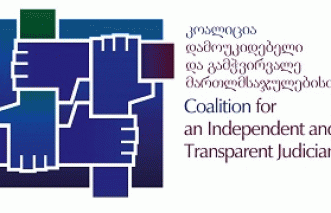NGOs refuse to present their report and protest of the developments in the judicial system
June 2, 2017

On May 30, the Georgian Young Lawyers’ Association (GYLA) and Transparency International – Georgia were scheduled to present their fifth report of monitoring the High Council of Justice of Georgia (HCoJ). However, in protest over the situation in the judicial system, the two NGOs refused to present the report.
The NGOs explained that their monitoring reports repeatedly demonstrate that the HCoJ uses its powers against the interests of justice, instead of protecting them. The failure of the Ministry of Justice, the entity responsible for justice reforms, and the legislative authorities to act, and the inadequacy of legislative reforms that they have implemented so far, grants the HCoJ absolute power to act in an arbitrary manner, which is leading the judiciary into a crisis. Despite this, authorities are failing to take effective measures to address the crisis.
Authorities often state that a comprehensive reform of the judiciary requires time, and that what is important is that the reform process is on the right track. This is a misleading message and a way of avoiding responsibility. The judiciary reform in Georgia is not on the right track and the three waves of reform implemented so far have not resulted in any tangible results. Individuals not trusted by the public and viewed as incompetent are returning to the judicial system, and this time for life; moreover, they are appointed to high administrative positions. The reins of the judiciary continue to be concentrated into the hands of a single group, transforming the judiciary into a closed corporate system. Such developments can only take place if they are supported by the political authorities.
The NGOs also noted that for many years the civil sector has been actively and constructively working on the problematic issues of the judiciary. For instance, they actively participated in the process of revising the Constitution and provided many recommendations and opinions, including about the chapter on the judiciary. The NGOs also worked together with foreign experts and representatives of the judicial authority to develop a judicial development strategy and action plan, as required under the EU-Georgia Association Agreement, and the strategy and action plan were recently approved.
However, a crisis is unfolding in the judiciary. This was clearly illustrated once again by developments over the last few days: arbitrary decisions by the HCoJ that allow a small group of judges to establish control over the judiciary, which the Council is trying to ensure before the terms of the majority of its members expires in a few days, as well as the results of the competition to select candidates for the vacant position of the Georgia-nominated judge to the European Court of Human Rights. This led the organizations to believe that the presentation of the monitoring report would have been pointless.
GYLA and Transparency International – Georgia will continue to monitor the High Council of Justice and to actively address the problems and challenges faced by the judiciary. Moreover, the Coalition for Independent and Transparent Judiciary, of which both organizations are members, urges the Parliament of Georgia to create a parliamentary forum to openly discuss the crisis in the judicial system and to immediately start work on a comprehensive package of reforms.
The Coalition is ready to actively engage in the process and to cooperate in preparing all changes that will promote a healthy judicial system and increase public trust in the judiciary.
News
December 13, 2023
Ethnic minorities outside the peace dialogue
November 6, 2023
‘Peace’ agenda of political parties
Popular
Articles
February 13, 2024



